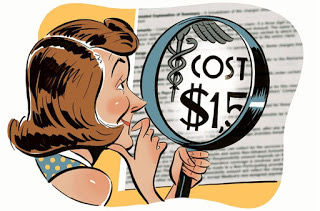Transparency Price Tools Did Not Lower Health Costs
- EverythingHealth

- May 14, 2016
- 2 min read

For years experts have been saying if consumers knew the price of certain health care services they would be able to decide what services bring "value" and they could be better "shoppers" of health care. Since so many patients have large deductibles and copays, it has been conventional wisdom that providing transparent prices would lower overall costs. As people are spending their own money, giving them prices to compare should make them savvy consumers, right?
Wrong! The Journal of American Medical Association, JAMA, did a study of employees that were given access to price transparency tools and it did not lower health care spending.
The authors compared the rate of change in health care spending among employees of two employers who offered a tool where they could compare prices of what they would pay out-of- pocket for various physician, lab and hospital services. Top searches were for colonoscopies, obstetric services, office visits and gastric bypass surgery. The majority of searches was for services over $500 and more than half had price estimates over $1250. They compared the spending of people who had access to these price estimators and those who did not. They even found that people who had the price estimators, had increased out-of-pocket health care spending compared to those who did not. The study matched the two groups for age, sex, health condition and type of insurance plan.
What can we make of this strange result? First, only a small percent of employees who were offered the tool even used it. Obviously it has to be used to be effective. Maybe it was too cumbersome or difficult to use. Another reason may be patient perception of quality. Other studies have shown that patients erroneously think higher price means higher quality. If patients think a lower cost health service is inferior, they might shy away from it. And since most of the searches were for expensive services, patients might think they were already using their entire deductible so they may as well go for the expensive ("perceived higher quality") medical service.
It is also quite possible the health care is NOT like going to the grocery store or other retail purchases. Patients may not like price shopping and comparing when it comes to something as important as their health. A recommendation from one's trusted physician about who to see and where to go may override a price comparison website. Health care can be scary and baffling to many people and the risk of making the wrong choice is much more serious than buying the wrong Ketchup at the market.
This important study showed that we may need to look at other ways than price transparency tools to help patients bring down the cost of health care in the United States.









Comments